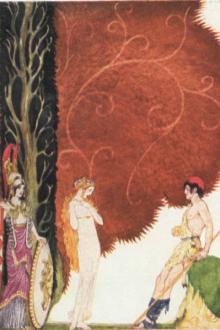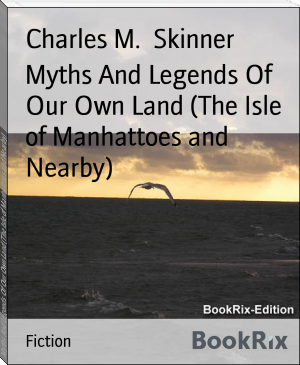The Adventures of Odysseus and The Tales of Troy - Padraic Colum (i read books .txt) 📗

- Author: Padraic Colum
- Performer: -
Book online «The Adventures of Odysseus and The Tales of Troy - Padraic Colum (i read books .txt) 📗». Author Padraic Colum
The stranger rose up from where he sat and went with Telemachus from the hall and through the court and to the outer gate. Telemachus said: 'What you have told me I shall not forget. I know you have spoken out of a wise and a friendly heart, and as a father to his son.'
The stranger clasped his hands and went through the gate. And then, as he looked after him Telemachus saw the stranger change in his form. He became first as a woman, tall, with fair hair and a spear of bronze in her hand. And then the form of a woman changed too. It changed into a great sea-eagle that on wide wings rose up and flew high through the air. Telemachus knew then that his visitor was an immortal and no other than the goddess Athene who had been his father's friend.
IIIhen Telemachus went back to the hall those who were feasting there had put the wine-cups from them and were calling out for Phemius, the minstrel, to come and sing some tale to delight them. And as he went amongst them one of the wooers said to another, 'The guest who was with him has told Telemachus something that has changed his bearing. Never before did I see him hold himself so proudly. Mayhap he has spoken to him of the return of his father, the renowned Odysseus.'
Phemius came and the wooers called upon him to sing them a tale. And the minstrel, in flowing verse, began the tale of the return of the Kings and Princes from Troy, and of how some god or goddess put a trouble upon them as they left the City they had taken. And as the minstrel began the tale, Penelope, Telemachus' lady-mother, was coming down the stairs with two hand-maids beside her. She heard the words he sang, and she stood still in her grief and drew her veil across her face. 'O Phemius,' she cried, 'cease from that story that ever wastes my heart—the story that has brought me sorrow and that leaves me comfortless all my days! O Phemius, do you not know other tales of men and gods that you might sing in this hall for the delight of my noble wooers?'
The minstrel would have ceased when Penelope spoke thus to him, but Telemachus went to the stairway where his lady-mother stood, and addressed her.
'My lady-mother,' said he, 'why should you not let the minstrel delight the company with such songs as the spirit moves him to give us? It is no blame to him if he sings of that which is sorrowful to us. As for you, my mother, you must learn to endure that story, for long will it be sung and far and wide. And you are not the only one who is bereaved—many another man besides Odysseus lost the happy day of his homecoming in the war of Troy.'
Penelope, his lady-mother, looked in surprise at the youth who spoke to her so wisely. Was this indeed Telemachus who before had hardly lifted his head? And as she looked at him again she saw that he carried his head—that head of his that was so like Odysseus'—high and proudly. She saw that her son was now indeed a man. Penelope spoke no word to him, for a new thought had come into her mind. She turned round on the stairs and went back with her hand-maids to the chamber where her loom and her distaff were. And as she went up the stairway and away from them her wooers muttered one to the other that she would soon have to choose one of them for her husband.
Telemachus turned to those who were standing at the tables and addressed them. 'Wooers of my mother,' he said, 'I have a word to say to you.'
'By the gods, youth,' said one of the wooers, 'you must tell us first who he is who has made you so high and proud of speech.'
'Surely,' said another, 'he who has done that is the stranger who was with him. Who is he? Why did he come here, and of what land has he declared himself to be?'
'Why did he not stay so that we might look at him and speak to him?' said another of the wooers.
'These are the words I would say to you. Let us feast now in peace, without any brawling amongst us, and listen to the tale that the minstrel sings to us,' said Telemachus. 'But to-morrow let us have a council made up of the chief men of this land of Ithaka. I shall go to the council and speak there. I shall ask that you leave this house of mine and feast on goods that you yourselves have gathered. Let the chief men judge whether I speak in fairness to you or not. If you do not heed what I will say openly at the council, before all the chief men of our land, then let it be on your own heads what will befall you.'
All the wooers marvelled that Telemachus spoke so boldly. And one said, 'Because his father, Odysseus, was king, this youth thinks he should be king by inheritance. But may Zeus, the god, never grant that he be king.'
Then said Telemachus, 'If the god Zeus should grant that I be King, I am ready to take up the Kingship of the land of Ithaka with all its toils and all its dangers.' And when Telemachus said that he looked like a young king indeed.
But they sat in peace and listened to what the minstrel sang. And when evening came the wooers left the hall and went each to his own house. Telemachus rose and went to his chamber. Before him there went an ancient woman who had nursed him as a child—Eurycleia was her name. She carried burning torches to light his way. And when they were in his chamber Telemachus took off his soft doublet and put it in Eurycleia's hands, and she smoothed it out and hung it on the pin at his bed-side. Then she went out and she closed the door behind with its handle of silver and she pulled the thong that bolted the door on the other side. And all night long Telemachus lay wrapped in his fleece of wool and thought on what he would say at the council next day, and on the goddess Athene and what she had put into his heart to do, and on the journey that was before him to Nestor in Pylos and to Menelaus and Helen in Sparta.
IVs soon as it was dawn Telemachus rose from his bed. He put on his raiment, bound his sandals on his feet, hung his sharp sword across his shoulder, and took in his hand a spear of bronze. Then he went forth to where the Council was being held in the open air, and two swift hounds went beside him.
The chief men of the land of Ithaka had been gathered already for the council. When it was plain that all were there, the man who was oldest amongst them, the lord Ægyptus, rose up and spoke. He had sons, and two of them were with him yet, tending his fields. But one, Eurynomous by name, kept company with the wooers of Telemachus' mother. And Ægyptus had had another son; he had gone in Odysseus' ship to the war of Troy, and Ægyptus knew he had perished on his way back. He constantly mourned for this son, and thinking upon him as he spoke, Ægyptus had tears in his eyes.
'Never since Odysseus summoned us together before he took ship for the war of Troy have we met in council,' said he. 'Why have we been brought together now? Has someone heard tidings of the return of Odysseus? If it be so, may the god Zeus give luck to him who tells us of such good fortune.'
Telemachus was glad because of the kindly speech of the old man. He rose up to speak and the herald put a staff into his hands as a sign that he was to be listened to with reverence. Telemachus then spoke, addressing the old lord Ægyptus.
'I will tell you who it is,' he said, 'who has called the men of Ithaka together in council, and for what purpose. Revered lord Ægyptus, I have called you together, but not because I have had tidings of the return of my father, the renowned Odysseus, nor because I would speak to you about some affair of our country. No. I would speak to you all because I suffer and because I am at a loss—I, whose father was King over you, praised by you all. Odysseus is long away from Ithaka, and I deem that he will never return. You have lost your King. But you can put another King to rule over you. I have lost my father, and I can have no other father in all my days. And that is not all my loss, as I will show you now, men of Ithaka.
'For three years now my mother has been beset by men who come to woo her to be wife for one of them. Day after day they come to our house and kill and devour our beasts and waste the wine that was laid up against my father's return. They waste our goods and our wealth. If I were nearer manhood I would defend my house against them. But as yet I am not able to do it, and so I have to stand by and see our house and substance being destroyed.'
So Telemachus spoke, and when his speech was ended Antinous, who was one of the wooers, rose up.
'Telemachus,' said he, 'why do you try to put us to shame in this way? I tell all here that it is not we but your mother who is to blame. We, knowing





Comments (0)